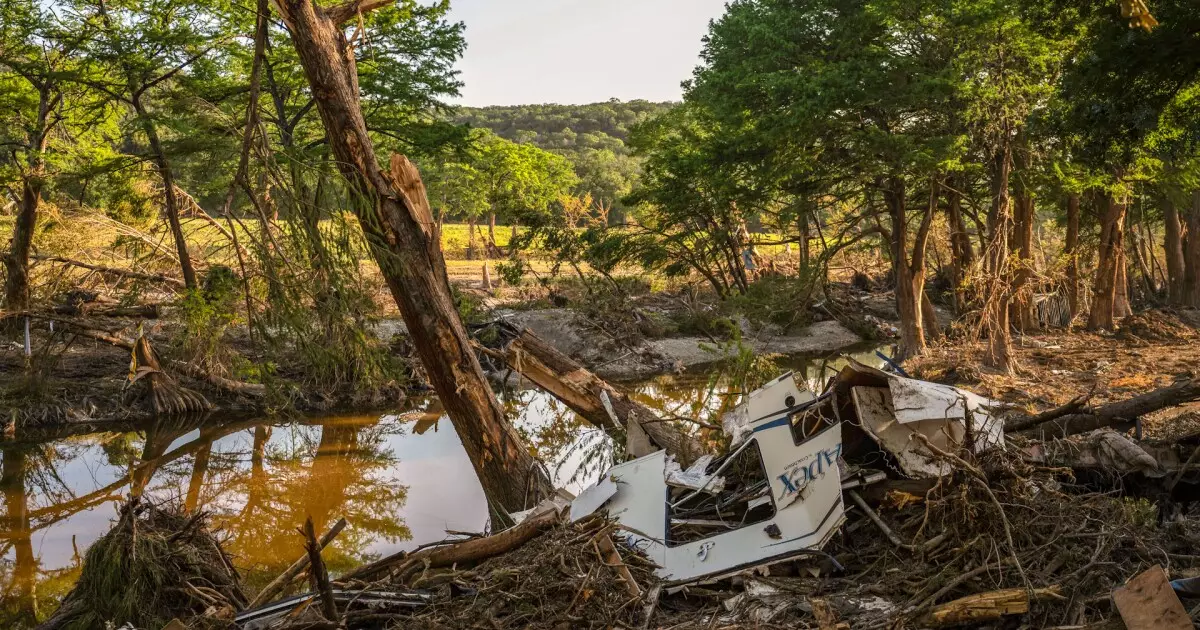The recent catastrophic floods in Texas serve as a brutal reminder that leadership lacking foresight will ultimately pay the price. The flooding along the Guadalupe River over Independence Day, which claimed over 130 lives and inflicted billions in damages, underscores a glaring failure to adequately prepare for natural disasters of increasing frequency and severity. While officials scramble to address the immediate fallout, there remains a distressing reluctance to confront the structural issues that deepen our vulnerability—chief among them, poor risk disclosure and misguided fiscal policies. Texas, a state characterized by its rugged individualism, must reconcile its growth ambitions with the harsh reality that climate change is no longer a distant threat but a clear and present danger demanding proactive management.
The decision to focus legislative energy on restricting local taxes and bonds, rather than investing in resilient infrastructure, signals a fundamental misunderstanding of how best to safeguard communities. Shrinking the ability of local governments to issue bonds—an essential tool for financing flood defenses, stormwater systems, and emergency preparedness—effectively hamstrings their capacity to adapt. If Texas continues down this path, it risks condemning its residents to increasingly catastrophic future floods, economic instability, and the erosion of confidence in government institutions that are supposed to serve the public good.
Tax Restrictions: Short-Sighted Strategies that Undermine Long-Term Safety
The push for constitutional amendments requiring supermajority approval for local bonds, and proposals to eliminate property taxes by 2031, are deeply problematic from a practical standpoint. While these measures might appeal to fiscal conservatives wary of local government overreach, they threaten to strip communities of the financial flexibility needed to respond to climate-induced disasters. Infrastructure investment is inherently capital-intensive, and bonds—despite their criticisms—remain the most straightforward and cost-effective means of funding large-scale mitigation projects.
Eliminating property taxes without establishing an equitable alternative shifts the burden elsewhere—most likely onto state or federal coffers—and disregards the importance of local control. During crises, local governments are on the front lines; their ability to quickly raise funds through bonds or taxes is crucial. Curtailing this capacity not only hampers immediate response but also hampers preventive measures that could reduce long-term costs—costs that taxpayer-funded disaster relief simply cannot sustain indefinitely.
Disaster Preparedness: An Afterthought in a Fiscal Fumble
Despite the clear lessons from the recent floods, Texas officials seem content to devote limited resources to crisis management rather than comprehensive risk mitigation. Governor Greg Abbott’s focus on emergency communication and flood warning systems feels more like band-aid solutions than a genuine commitment to reducing vulnerability. With only $3.1 billion available for flood prevention projects—out of an estimated $54.5 billion in needed solutions—such efforts are grossly underfunded.
This misallocation reveals a troubling prioritization: political battles over bond issuance and tax restrictions take precedence over the urgent need for resilient infrastructure. Infrastructure investments—such as levees, storm surge barriers, and advanced warning systems—are expensive, yes, but they are investments in lives and economic stability that pay off manifold over time. The reluctance to commit adequate funds reveals a short-sighted obsession with immediate political gains rather than a mature understanding of risk management.
The Financial Blind Spot: Risks and Transparency in Municipal Bonds
The recent flooding incident exposes a critical flaw in Texas’s municipal finance practices: a startling lack of transparency regarding flood risk in bond offerings. The report on Kerr County and Kerrville Public Utility Board’s bond disclosures shows a troubling pattern—disclosure of risk was minimal, despite awareness of flood dangers. This practice compromises the integrity of the municipal bond market and places investors—and ultimately taxpayers—at unnecessary peril.
Transparent risk disclosure should be a non-negotiable standard, allowing investors to factor in the true costs of climate change into their decisions. When governments withhold or downplay environmental risks, they foster an environment of misinformed investment, leading to compounded financial and social liabilities. The Texas example underscores the need for stricter federal and state regulations to enforce honest and comprehensive disclosure standards, especially in an era where climate-related disasters are escalating.
Political Will vs. Practical Wisdom
Ultimately, Texas’s current approach reflects a fundamental disconnect between political rhetoric and practical governance. Politicians propose measures that would inhibit their ability to build resilience, all under the guise of fiscal conservatism. Yet, this ideology neglects the fundamental truth that effective disaster mitigation requires long-term investment and acknowledgment of unavoidable risks. Treating floodplain management and infrastructure development as optional luxuries, rather than necessities, ensures that the state remains perpetually reactive rather than proactive.
Reacting to crises with superficial fixes ignores the reality that climate change intensifies the frequency and severity of such events. The real solution requires embracing a nuanced, center-right approach—one that champions fiscal responsibility while recognizing that prudent investment in infrastructure is both economically rational and morally obligatory. Texas should harness its entrepreneurial spirit to innovate in resilience, rather than succumb to the short-termism that hampers sustainable progress.
The Texas floods of recent weeks reveal that leadership has its priorities severely misplaced. The focus on political battles over bonds and taxes distracts from the urgent need to modernize infrastructure and improve risk awareness. As a center-right advocate, I believe that true fiscal conservatism must include investments that safeguard economic stability and public safety. The state’s future depends on its ability to adapt intelligently to the realities of climate change—embracing both fiscal discipline and proactive resilience, rather than clinging to outdated notions of austerity that threaten to leave Texans vulnerable and underprepared. The question is not whether Texas can afford to ignore climate risks—it is whether it can afford not to invest in its own resilience.

